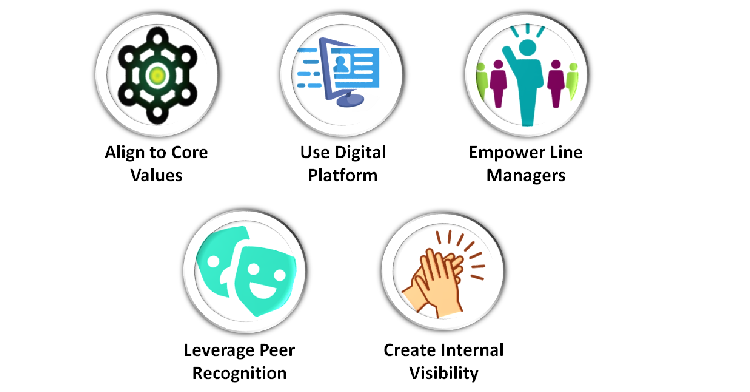1. Align Recognition with Core Values: Ensure employee recognition programs are aligned with the organization’s core values to encourage behaviors that support desired cultural changes.
2. Empower Managers and Peers: Enable managers and peers to recognize and reward employees in real-time, promoting a culture of appreciation and reinforcing positive behaviors.
3. Leverage Digital Platforms: Utilize digital platforms to simplify, speed up, and increase visibility around recognition, fostering an inclusive and transparent culture.
4. Create Public Visibility Around Recognition: Publicly celebrate employee achievements through various channels, including team meetings and digital tools, to motivate others and reinforce the desired cultural shift.
All business leaders today acknowledge the importance of organizational culture in driving sustained business growth and profitability. Employee recognition can drive culture change and help create the desired organizational culture.

Every organization has a unique culture; it is the total of all the written and unwritten rules that govern the behavior of employees of any organization.
Organizational culture defines the environment in which employees work and operate.

These desired behaviors represent the core values of the organization.
So, it helps guide employees’ decisions and actions and helps them stay on course with the organization’s vision and mission.

Culture plays a vital role in ensuring the ultimate success of the business.
Having a strong and positive organizational culture ensures consistent business growth and high levels of employee engagement.

Organizational culture helps to establish the ground rules of behavior and communication among employees within the workplace.
It enables employees to clearly understand what is expected of them and promotes cooperation and collaboration.
A good organizational culture ensures that employees feel valued and cherished; this enhances their efficiency and performance.

Employee recognition can help reinforce the organization’s core values and reward and recognize positive behaviors that align with the organization’s desired culture.
Cultural changes need to be subtle in most cases; employee recognition is an excellent tool to bring about such changes without causing fear, confusion, and disruption.
A good organizational culture needs to evolve constantly to meet the changing needs of the workplace.
Hence, recognizing employees for their efforts towards adopting such changes goes a long way in promoting a positive and growth-oriented work culture.

Learning to use new technologies, adopting new work processes, and even cooperating and collaborating with new team members are all part of constant changes within an organization.
Therefore, employee recognition can drive culture change more softly, without making the employees feel disconnected or alienated from the organization.
An effective employee recognition program boosts employee motivation, satisfaction, and morale. It can also help drive culture culture within the organization.
So, here are a few practical ways of leveraging employee recognition to promote changes in the organization’s culture:
1. Align Recognition To Core Values
2. Use A Digital Employee Recognition Platform
3. Empower Line Managers To Recognize
4. Leverage Peer-to-Peer Recognition
5. Create Visibility Around Recognition


An effective way to promote desirable behaviors is by rewarding and recognizing the employees exhibiting the same.
Hence, organizations need to ensure that the employee recognition program is well-integrated with the core values and operating principles of the organization.
Such recognition for demonstrating core values motivates these employees to repeat such behaviors.
It also inspires other members of the workforce to emulate those who have.

A digital employee recognition platform can make it easier for organizations to align their recognition programs with their core values.
Hence, it can simplify and speed up identifying and recognizing employees who have demonstrated desired behaviors.

Organizations should empower frontline managers to acknowledge and recognize their team members who demonstrate the core values without any delay.
Hence, they are well-positioned to identify and recognize behaviors aligning with their values and culture.
The HR team should support this by making the managers and supervisors well aware of the importance of such initiatives.

Another effective way to drive culture change is to involve peers in recognizing employee actions and behaviors that align with the core values.
Therefore, enabling peer-to-peer recognition around cultural values can help organizations drive the desired changes.
Coworkers are often better positioned than supervisors and HR to acknowledge and recognize such behaviors.

It is important not just to reward and recognize employees who demonstrate desirable behaviors but to celebrate such recognition publicly within the organization.
To create maximum visibility around recognition, offline forums, such as team meetings and town halls, and digital platforms, such as collaboration tools, should be leveraged.
This will help motivate them and inspire others to follow their path.

The involvement of top management in employee recognition programs can also boost the entire process.
It underscores the importance of the recognition and the underlying culture change the organization is trying to drive.
Leveraging employee recognition to drive culture change can help create a happier workplace with an engaged workforce, aligned to the desired set of core values of the organization. Hence, it can make the process of such changes much smoother, painless, and sustainable.

Lead author: Sagar Chaudhuri, the Co-Founder and CEO of HiFives. He is an HR Tech Evangelist with over 25 years of corporate and entrepreneurship experience. In the past, Sagar has worked in leadership roles with companies such as Genpact, Infosys, and ICICI Bank. He has an engineering degree from IIT Kharagpur and an MBA from IIM Lucknow. Connect on LinkedIn
To stay updated on the latest HiFives blogs, follow us on Twitter (@MyHiFives)